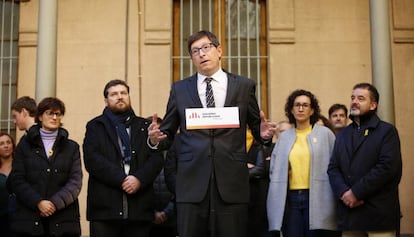Catalan separatists keep independence plans, but stay vague on time frames
Key parties ERC and JuntsxCat pushing for “dialogue” with Spanish state after December 21 election

Catalonia’s separatist parties plan to keep up their independence bid after the regional election of December 21. But they are no longer specifying dates or the methods they will use to “build a Catalan republic,” in contrast with their campaign promises prior to the 2015 election.
Another difference is that Junts per Catalunya (JuntsxCat), the platform headed by former premier Carles Puigdemont, and the Catalan Republican Left (ERC), whose leader is former deputy premier Oriol Junqueras, are openly vying for the title of Catalonia’s top separatist party, whereas in 2015 they had campaigned together as Junts pel Si.
Dialogue does not entail giving up on any political goal
Marta Rovira, ERC
Puigdemont is now in self-imposed exile in Belgium, from where he is conducting an online campaign, and Junqueras is in pre-trial custody in Madrid as part of a criminal investigation into rebellion over the illegal independence push. Both were removed from office, along with the rest of their government team, when Prime Minister Mariano Rajoy invoked Article 155 of the Spanish Constitution in a bid to restore the law in the breakaway region.
Earlier this week, the Supreme Court decided to release six members of the ousted Catalan government who were in pre-trial custody, but to keep Junqueras and the former interior affairs chief, Joaquim Forn, behind bars. The court also lifted the European arrest warrant against Puigdemont but maintained the Spanish one, meaning that if the ousted Catalan leader returns to Spain he will be immediately detained.
Meanwhile the far-left CUP, whose parliamentary support had allowed Junts pel Si to pass its breakaway legislation, now says that both campaign platforms are too ambiguous about the terms of independence. The anti-establishment group dismisses the plans as “autonomist” rather than truly secessionist.
The CUP dismisses the plans as “autonomist” rather than truly secessionist.
During its campaign run for the election of September 27, 2015, the Junts pel Si coalition gave itself 18 months to hold constituent elections for a new Catalan state. Its deal with the CUP introduced a few changes to this roadmap, including the holding of the illegal referendum on October 1. Disagreement over the declaration of a republic inside the Catalan parliament was the final factor that broke up the separatists’ unity.
Separatists are loath to give up on their secession push, but by now they have realized that unilateral independence is not possible, and that no foreign country will recognize it. The strategy has therefore changed, with the top priority now being a repeal of the emergency measures in place since the application of Article 155, which gave Madrid the power to temporarily curtail Catalonia’s broad powers of self-rule.
Josep Rull, who is number six on Puigdemont’s ticket, summed up their goals at a Tuesday rally: “Freedom, amnesty, dignity and democratic normality.” After that, both JuntsxCat and ERC want to keep “building the Catalan republic,” but without any clear roadmap or deadlines.
Instead, ERC’s campaign platform now talks about working to “make effective the recognition of the right to self-determination” as reflected on October 1, the day of the illegal referendum. It also adds that this can only be achieved through a “bilateral negotiation” with the Spanish state, on equal terms, “and without any prior renunciation by the Catalan parliament or government.”
“Dialogue does not entail giving up on any political goal,” said ERC official Marta Rovira.
Meanwhile, JuntsxCat’s program also talks about “building the Catalan republic” and “the right to self-determination,” but offers no timeline and no plan beyond “opening up a dialogue with the Spanish state” after Puigdemont is “restored” to his position of Catalan premier and the criminal investigations against him and other ex-officials are dropped.
Elsa Artadi, the campaign manager for JuntsxCat, said that if separatist forces win on December 21, they will have “more negotiating power.”
English version by Susana Urra.
Tu suscripción se está usando en otro dispositivo
¿Quieres añadir otro usuario a tu suscripción?
Si continúas leyendo en este dispositivo, no se podrá leer en el otro.
FlechaTu suscripción se está usando en otro dispositivo y solo puedes acceder a EL PAÍS desde un dispositivo a la vez.
Si quieres compartir tu cuenta, cambia tu suscripción a la modalidad Premium, así podrás añadir otro usuario. Cada uno accederá con su propia cuenta de email, lo que os permitirá personalizar vuestra experiencia en EL PAÍS.
¿Tienes una suscripción de empresa? Accede aquí para contratar más cuentas.
En el caso de no saber quién está usando tu cuenta, te recomendamos cambiar tu contraseña aquí.
Si decides continuar compartiendo tu cuenta, este mensaje se mostrará en tu dispositivo y en el de la otra persona que está usando tu cuenta de forma indefinida, afectando a tu experiencia de lectura. Puedes consultar aquí los términos y condiciones de la suscripción digital.








































